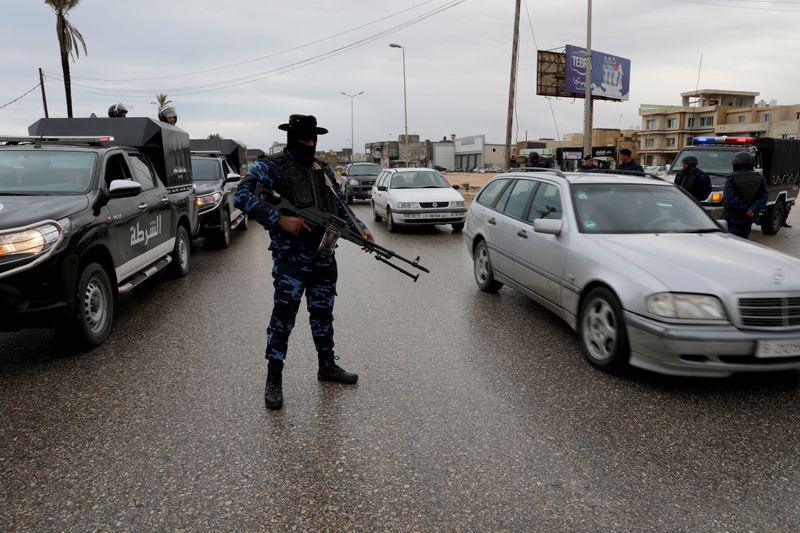By Aidan Lewis
CAIRO (Reuters) - The planned arrival of Turkish military advisers in Libya should bolster the internationally recognized government, but may not be enough to turn the tide of a conflict in which eastern-based forces have the upper hand thanks to foreign support.
Turkey's decision to send the advisers and technical experts responded to a request by Prime Minister Fayez al-Serraj's Government of National Accord (GNA), which Ankara backs against forces allied to veteran commander Khalifa Haftar.
Turkey has already provided drones and armored vehicles for the defense of the capital, Tripoli, which helped quickly stall the offensive launched by Haftar's forces nine months ago.
But Turkish backing has often been outweighed by air power from the United Arab Emirates in support of Haftar's self-styled Libyan National Army (LNA), and by a technological and frontline edge provided by Russian military contractors since September, officials, diplomats and analysts say.
"The decision by the GNA to request military support from Turkey follows a dangerous escalation in the conflict from Haftar and his backers, including bringing in Russian mercenaries," GNA Interior Minister Fathi Bashagha said in a statement to Reuters.
On Monday, the LNA advanced into Sirte, a strategic city in the center of Libya's Mediterranean coastline, and fighting has increased around Tripoli in recent weeks.
This has heightened pressure on GNA forces, which two sources close to those forces said had been struggling against missile systems being used to bring down drones and laser-guided shells thought to have been introduced by Russian contractors.
The GNA's drone fleet has also been depleted by attacks on airports and air bases in Tripoli and the city of Misrata, northwest of Sirte.
Turkish officials have indicated that any deployment will not involve troops but that Turkey has been considering sending Syrian rebels. A source in the Turkey-backed Free Syrian Army said some fighters had already signed up as guards.
"What this will bring above all is a rebalancing of forces," said Arnaud Delalande, an independent defense consultant and Libya expert. "In particular it could bring air defense, which could be jamming systems, but also coordination of troops on the ground."
RUSSIAN AND TURKISH COOPERATION
Maneuvering in Libya by Russia and Turkey, whose presidents meet in Turkey on Wednesday, has overshadowed European efforts to revive a U.N.-led peace process.
Although Turkey and Russia have generally been on opposing sides in Syria's civil war, they have strengthened economic and military ties recently. They now cooperate in northeast Syria, where they mount joint patrols, and Ankara bought Russian missile defense systems last year despite opposition in Washington.
Ankara and Moscow want to protect their strategic interests in Libya, where they lost lucrative contracts in 2011 after a NATO-backed uprising, and in the wider east Mediterranean region. [L8N28R455]
The two countries are unlikely to clash directly, with Ankara seeking leverage to negotiate over offshore gas drilling rights after signing military and maritime accords with the GNA in November.
"In Libya, Ankara's end game is not to help Tripoli win the conflict, which is not realistic. It is to create a stalemate and political negotiations that preserve its maritime demarcation deal," said Sinan Ulgen, a former Turkish diplomat who heads the Istanbul-based Center for Economics and Foreign Policy Studies think tank.
A senior Turkish official told Reuters: "Turkey is in close contact with Russia to prevent conflict. This will continue."
Russia could be eyeing a long-term goal of having a naval base in eastern Libya, said Jalel Harchaoui, a research fellow with the Clingendael Institute think tank in The Hague.
"Russia is presented with a golden opportunity to make its presence in eastern Libya more entrenched," he said.
Ankara and Moscow are filling a gap left by U.S. disengagement in Libya under President Donald Trump and there are divisions among European states over Libya.

"I think the Europeans are completely left out in the cold here," said Harchaoui. "They're scrambling."